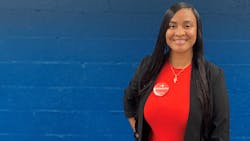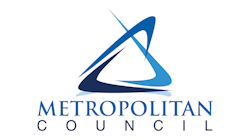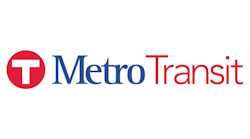One word to describe yourself: Eclectic
Alma Mater: University of Minnesota
Fun fact about yourself: I chase Caribbean carnivals globally. Nothing is more freeing and fun than wearing a glamourous feathered costume while listening to blaring Soca music and dancing for hours.
Favorite station or stop that you have ever visited or frequent (and why): Union Station, Chicago. I’ve always had an affinity towards ancient things, hence the anthropology degree. The design of Union Station always reminds me of the Parthenon in Greece. Especially the grand staircase, with its clean lines leading down to pillars. Let’s not forget the infamous staircase scene in the film “Untouchables.” That scene stood out to me due to it being at Union Station.
Favorite station or stop that you have ever visited or frequent (and why): My favorite route is one that I operated. The Green Line light rail between Minneapolis and St Paul. I felt like a pioneer of uncharted territory as I was one of the operators hired to open the line. Being new to light-rail operation and it being a new line made the experience exhilarating. It was great to see the project come to fruition and to be a part of it. Also, the construction of the line dominated my life for a period. As a bus operator, at the time of construction, the bus routes I drove were on long-term detours, which affected me at work. At home, there were periods of time where I had to use alternate building exits due to construction. On my university campus, we could hear the pile driving in our lecture halls. It was evident that I’d rise to the calling of operating the Green Line once construction was completed.
Ruby Daniels began her career at Metro Transit as a bus operator and has advanced to agency management by showing a capacity for innovation, empathy in leadership and a commitment to making an impact at the agency and within the industry.
Daniels practices and promotes servant leadership, a philosophy centered in trust, caring and focusing on the value of people. This leadership approach has been helpful during the past few years with the upheaval caused by the pandemic. Daniels focused on keeping operator morale up. One example involved a contest where operators posted a photo of themselves as babies on a wall and whomever guessed the most correct won a gift card. She recognized the importance of keeping connections strong among operators. She also works with Metro Transit’s Fit for Life program to help operators find ways to reduce stress and be healthy.
Daniels successfully initiated, planned, executed and monitored the transit operation’s response to a major highway construction project that heavily impacted transit in the Twin Cities area. She also played a big role in the security screening of post-game buses during Minneapolis Super Bowl 52, helping Metro Transit earn a passing grade for the event. Additionally, Daniels was an integral part of executing the CX360 program, a program which took a wholistic approach to improve troubled routes. She joined the On Time Performance Committee to assist with schedule adherence, noted what caused routes to lose time and devised a plan to decrease boarding times. Overall, the results of the CX360 program showed major improvements to the agency’s on-time performance and overall customer experience.
Colleagues says Daniels is the first to take advantage of a professional development opportunity and completed the Project Management Development program and Mentoring Works, both hosted by the Metropolitan Council.
In January, Daniels became the chair of Metro Transit’s first employee resource group, Advancing Women in Transit (AWT). In this role, she is promoting and encouraging women to advance within transit by providing them with skills, resources and the confidence to do so. She is described as a beacon of hope and inspiration for many women at the agency. Her innovation show’s each month as she conducts virtual meetings with increasing engagement, not just for Metro Transit but for the entire Metropolitan Council. Since Daniels became chair, membership, attendance and engagement in the group has increased.
Is there a specific experience that led you to where you are today?
There is no one specific experience that led me to where I am today, rather yet an amalgamation of experiences. Honestly, I can admit that a career in transit was my plan B. I worked part time as a bus operator while attending university, all the while knowing that a career with transit was an option. Due to family obligations, I decided to stay local and not pursue graduate studies in anthropology. Nonetheless, my plan B morphed into plan A, as it didn’t take long for me to fall in love with transit. What really drew me in was the sustainability of public transportation. I’m fortunate enough to work for a forward-thinking company that prioritizes sustainability efforts. Additionally, I’m able to continuously practice a sort of applied anthropology within transit. The Twin Cities has a very diverse community. We here at Metro Transit are proud to state that our agency reflects the community we serve, thus my background in anthropology has proven vital to the working relationships I’ve developed with internal and external partners.
What do you enjoy most about your job?
I’m an operations person by heart, I enjoy all things operations. The fast pace of it all paired with operations being rooted in problem solving really gives me purpose. What I enjoy most about being an assistant transportation manager is connecting with our operators, getting to know them and advocating for them. Often operators are dehumanized, getting to know their stories, hobbies and aspirations eliminates that. Operations and especially operators don’t get the credit they deserve in the industry. Therefore, I make it my duty to show appreciation for the hard work they do, literally day in and day out. Our operators have had it rough the past couple of years, managing civil unrest, in addition to pandemic woes. Through it all, they have shown up and got the job done. For that very reason, I would like to share this award with my operations colleagues and especially our operators. Truly, we are all in this together.
What’s the most challenging part of your job?
Currently, the greatest challenge is the operator shortage. Just as many industries are suffering from worker shortages, we too are experiencing a shortage of operators. There are many challenges people perceive as obstacles to becoming an operator. However, the fact that a huge part of our shortage is due to operator retirement, highlights the viability of a career as an operator.
Accomplishment you’re most proud of and why?
I’m most proud of becoming the chair of Advancing Women in Transit. It’s a company employee resource group that supports women within our agency. The goal is to develop skill, instill confidence and encourage women to seek advancement within transit. My team and I support and facilitate connection amongst 300 members. Our numbers and engagement have grown immensely since we’ve started our term in January and we really enjoy the allyship we’ve experienced from male colleagues. AWT has received great feedback about our monthly meetings and how they’ve changed the perspectives of many by giving them the courage to apply for positions that they may not have applied for prior to AWT involvement.
Best advice/tip/best practice to share from your area of expertise?
With the focus of public transit, my best practice is that of servant leadership. No matter your role in public transit, practicing servant leadership builds trust amongst our riding public, it helps develop relationships with the communities we serve. I practice servant leadership with operators because it is my belief that happy operators make happy passengers. It is an operator’s duty to serve the public, it is my duty to serve the operator.





